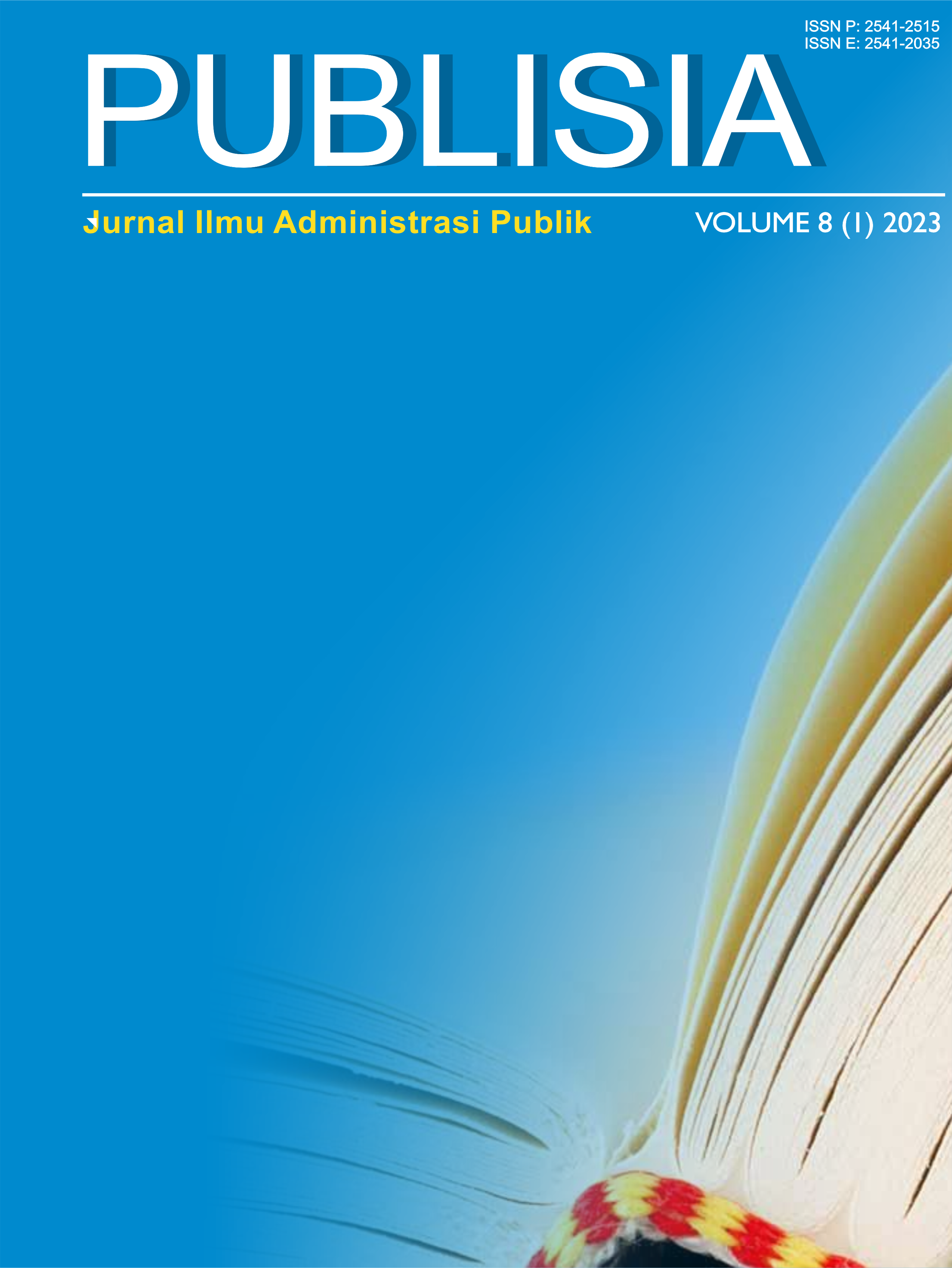Reflections of agile governance in public services in the digital age
DOI:
https://doi.org/10.26905/pjiap.v8i1.9154Keywords:
Agile governance, Digital age, Public servicesAbstract
The Covid-19 pandemic has prohibited us a lot in terms of bureaucratic governance where the bureaucracy must remain at the forefront in providing public services, such as optimization of ICT. The transformation of public services in e-government is directed at the implementation of flexible governance, so in this era of disruption, agile governance is needed and is a necessity in facing a crisis of existence for a country. This study aims to analyze how prepared the Disdikpora Bali Province is for Agile governance by upgrading public service quality, and services transformation and analyzing the obstacles or challenges that occur. Research using a qualitative-descriptive and inductive approach. Data was obtained using in-depth interviews and then analyzed using triangulation. Results show the level of readiness of the Bali Province Disdikporain realizing Agile governance in upgrading public service quality during the Digital Age can be said to be quite ready. The transformation of services from conventional to digitalization has been implemented and Bali ProvinceDisdikpora can respond and make adjustments to the changes that occur. The transformations carried out include the implementation of e-kepegawaian, e-aset, and e-DUPAK services. The lack of human capability in using ICT, inadequate infrastructure, and unstable internet connections are challenges in realizing Agile Governance.
Downloads
References
Adam, I. O. (2020). Examining e-government. Development effects on corruption in Africa: The mediating effects of ICT development and institutional quality. Technology in Society Journal., 1(2), 1–15.
Amalia, S. (2020). Melalui pandemi dengan organisasi dan kebijakan publik yang agile. Jurnal Wacana Kinerja, 1(1), 1–13.
Denning, S. (2015). How to make the whole organization Agile. Strategy & Leadership, 43(6), 10–17. https://doi.org/https://doi.org/10.1108/SL-09-2015-0074
Dewi, N. K., & Jayanti, A. (2017). Kajian analisa: Penerapan dan pengembangan e-government pada Pemerintah Propinsi Bali analytical review: Implementation and development of e-government Bali. Citec Journal, 4(2), 141–150.
Dhir, S., & Sushil. (2018). Flexible strategies in VUCA markets. Springer, 1(1), 1–10. https://doi.org/10.1007/978-981-10-8926-8
Gaffar, U. H. (2022). Realisasi vaksinasi nasional dalam perspektif agile governance. Journal Ilmu Sosial, Politik dan Pemerintahan, 11(1), 94–103. https://doi.org/https://doi.org/10.37304/jispar.v11i1.4206
Gaghman, A. (2020). The importance of good governance on achieving sustainable development case study: Yemen. KnE Social Science, 1(1), 1–12. https://doi.org/10.18502/kss.v4i1.5987
Halim, F. R., Astuti, F., & Umam, K. (2021). Implementasi prinsip agile governance melalui Aplikasi PIKOBAR di Provinsi Jawa Barat. Kolaborasi: Jurnal Administrasi Publik, 7(1), 1–12. https://doi.org/https://doi.org/10.26618/kjap.v7i1.4913
Janssen, M., & Voort, H. van der. (2020). Agile and adaptive governance in crisis response: Lessons from the COVID-19 pandemic. International Journal of Information Management, 55(1), 102–180.
Kiahno, E. (2021). Analisis Aplikasi Teko-Cak melalui agile governance sebagai perubahan peningkatan disiplin kinerja Pegawai Negari Sipil Pemerintah Kota Surabaya. Research Gate, 1(1), 1–10.
Kurniawan, D. I., Maulana, A., & Wicaksono, I. (2021). Agile governance sebagai bentuk transformasi inovasi pemerintah daerah. Doctoral Dissertation, Universitas Muhammadiyah Jember.
Kusumawati, W., & Kriswibowo, A. (2021). Agile governance Dinas Kesehatan Kabupaten Tulungagung dalam menangani Covid-19. Journal of Education, Humaniora and Social Sciences (JEHSS), 4(2), 1–10. https://doi.org/https://doi.org/10.34007/jehss.v4i2.736
Luna, A. J. H., Kruchten, P., & de Moura, H. P. (2015). Agile Governance Theory: Conceptual development. ArXiv, 1(1), 1–22. https://doi.org/https://doi.org/10.48550/arXiv.1505.06701 Focus to learn more
Padmaningrum. (2021). Penyederhanaan birokrasi melalui agile governance menuju layanan prima. Pawiyatan, 28(2), 54–64.
Purwanto, E. A. (2019). Kebijakan publik yang agile dan inovatif dalam memenangkan persaingan di era VUCA (Volatile, Uncertain, Complex and Ambiguous). Molecules, 9(1), 148–162.
Sari, M., & Aftrisia, D. (2020). Strategi penerapan agile governance pada masa pandemi Covid-19 di Pemerintah Kabupaten Musi Rawas Utara. Skripsi. Universitas Muhammadiyah Makassar.
Shangguan, Z., Wang, M. Y., & Sun, W. (2020). What caused the outbreak of COVID-19 in China: From the perspective of crisis management. International Journal of Environmental Research and Public Health, 1(1), 1–10. https://doi.org/https://doi.org/https://doi.org/10.3390/ijerph17093279
Suharnoko, Dwi, Umi Chayatin, and Chandra Dinata. 2018. “New Public Service Based on Citizen Centric on Malang Licensing Services in Era of Decentralization.†RUDN Journal of Public Administration 5(3):256–71. doi: 10.22363/2312-8313-2018-5-3-256-271.
Taufik, T., & Warsono, H. (2020). Birokrasi baru untuk new normal: Tinjauan model perubahan birokrasi dalam pelayanan publik di era Covid-19. Dialogue: Jurnal Ilmu Administrasi, 2(1), 1–18.
Vernanda, R. (2020). Kesiapan Indonesia menuju agile governance. KNIA 4.0, 4(1), 1–6. https://doi.org/http://180.250.247.102/conference/index.php/knia/article/view/147
Wijayanti, A., Ghofur, M., & Abdullah Alfatah, Z. (2020). Pendekatan konseptual agile manufacturing. Jurnal Teknologi dan Manajemen Industri, 1(1), 23.
Downloads
Published
How to Cite
Issue
Section
License
Authors who publish with this journal agree to the following terms:
- Copyright of the published articles will be transferred to the journal as the publisher of the manuscripts. Therefore, the author confirms that the copyright has been managed by the journal.
- Publisher of Publisia: Jurnal Ilmu Administrasi Publik University of Merdeka Malang.
- The copyright follows Creative Commons Attribution and share a like License (CC BY SA): This license allows to Share and copy and redistribute the material in any medium or format, Adaptative remix, transform, and build upon the material, for any purpose, even commercially.







